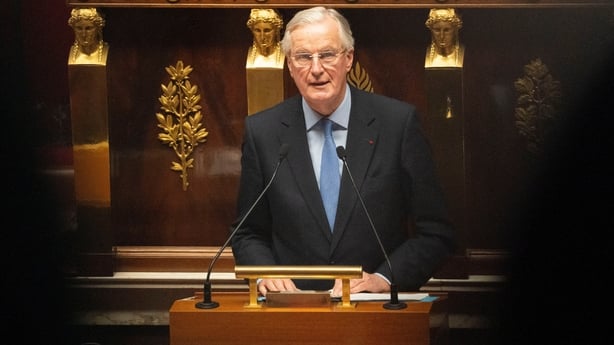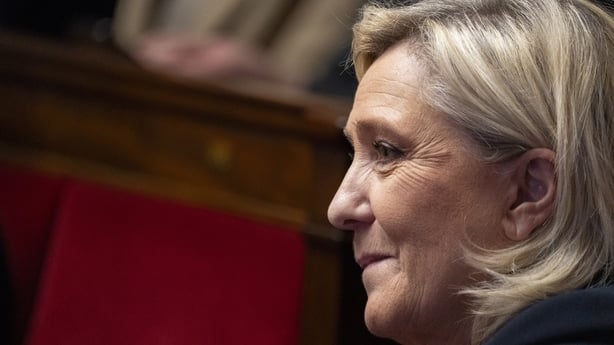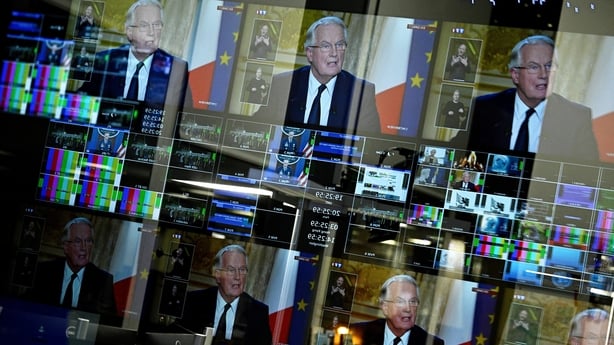French politicians have ousted their government with a no-confidence motion, an unprecedented move which plunges the eurozone's second-biggest economic power deeper into political turmoil.
Prime Minister Michel Barnier's administration is France's first to be forced out of office in more than 60 years, at a time when the country is struggling to tame a massive budget deficit.
He was just three months in office, and is now expected to tender his resignation and that of his government to President Emmanuel Macron shortly.
The no-confidence motion had been proposed by the hard left but crucially was backed by the far-right National Rally (RN) whose parliamentary party is led by Marine Le Pen.
Following the vote, the hard left urged President Macron to resign and call an election.

However, Marine Le Pen said that, while pressure is mounting on Mr Macron, the decision whether or not to resign was his to make.
"I don't consider it a victory, we made the choice to protect the French," she said this evening.
President Macron will address the nation at 7pm Irish time tomorrow, his office has announced.
Ahead of the vote, sources in his camp had indicated that the French leader plans to name a new prime minister quickly, possibly even before the grand reopening of Paris's Notre-Dame Cathedral at the weekend.
Controversial budget triggered vote
The no confidence motion had been prompted by Michel Barnier's decision to force through a social security financing bill without a vote yesterday, as part of his budgetary plan.
Mr Barnier had received a standing ovation in the National Assembly as he stepped up to defend his government's spending plans.
In his speech, he acknowledged that the budget "was not perfect" but said that it had been put together in just "15 days".
But it was not enough to save his administration.
The National Assembly approved the motion by 331 votes. A minimum of 288 were needed.

If a new prime minister is appointed quickly, it would avoid leaving a hole at the heart of the European Union at a time when Germany is also weakened and in election mode, weeks before US President-elect Donald Trump re-enters the White House.
But any new prime minister would face the same challenges as Mr Barnier in getting bills, including the 2025 budget, adopted by a divided parliament. There can be no new parliamentary election before July.
Brought in by President Macron in September to run a minority government after inconclusive parliamentary elections, Mr Barnier often said that knowing how "to keep one's cool" was essential to managing the thorny task.
But his draft budget had angered both the left and far right.
It sought to cut the fiscal deficit, which is projected to exceed 6% of national output this year, with €60 billion in tax hikes and spending cuts.
It also aimed to squeeze the deficit down to 5% next year.
'Completely out of touch'
In a television interview yesterday, Mr Barnier said he still believed his government could survive the vote.
But president of the RN Jordan Bardella said such optimism showed that the administration was "completely out of touch with what is happening in the country".
"This government is dangerous for my country," he told France Inter radio. "We will vote for the no-confidence motion."
Mr Barnier's interior minister, Bruno Retailleau, had not shared the prime minister's optimism.
"Nothing's over until the vote but we can see we're headed towards censure (of the government)," he told CNews.

President Macron, who won a second mandate in 2022, precipitated the crisis by calling the snap parliamentary election in June.
His term in office runs until mid-2027 and he cannot be forced out by parliament, but the RN and the hard left have already been saying he should resign as he faces his biggest crisis since the Yellow Vest popular unrest of 2018-2019.
Ahead of the vote, the socialist PS party said that it would act responsibly to help find a new government.
"The socialists will do their part," Boris Vallaud told the debate, calling for a broad coalition across the political spectrum without the far-right.

